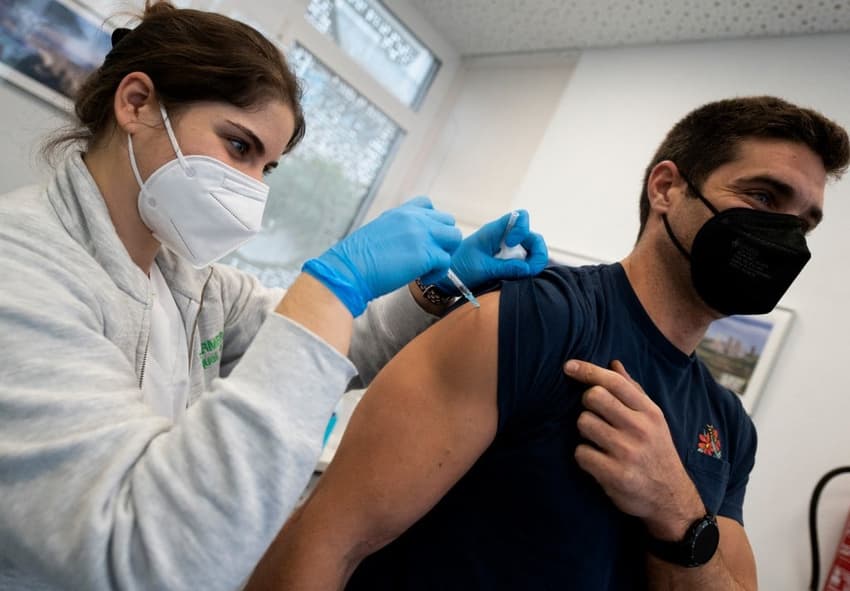Reader question: When should I get a fourth dose of the Covid-19 vaccine in Austria?

Austria's national vaccination board changed the recommendations for when to get the fourth dose of coronavirus vaccines. Here's what you need to know.
Over this weekend, Austria's national vaccination board (NIG) released an updated recommendation on Covid-19 immunisation, changing its previous guidance for the fourth dose of the coronavirus vaccination slightly.
According to the NIG, booster vaccinations can be given to persons aged 12 years and older and are recommended for anyone who wants to protect themselves.
READ ALSO: EXPLAINED: How to get the new adapted Covid-19 vaccine in Austria
In particular, the 4th vaccination is advised for persons over 60 years of age, persons at risk of severe disease progression (including pregnant women) and persons with an increased risk of exposure (healthcare workers, people in long-term nursing or care facilities, etc.).
The recommended interval between the third and fourth doses is from six months for people between 12 and 59 years old, NIG said. For those over 60 or risk patients, that interval is from 4 months.
What has changed then?
The main difference is the recommendation for those who have had a Covid-19 infection after their third shot.
"An infection in vaccinated persons usually leads to a booster effect (hybrid immunity), which can affect the optimal timing of the next vaccination.", NIG said.
However, the board specified that infection could only be "counted" after it was confirmed with a PCR test.
READ ALSO: Austria announces new Covid-19 vaccination campaign
So, if you have had a PCR-confirmed infection after your second or third shot and it was an asymptomatic case, you may follow the regular vaccination scheme. However, you can also postpone your vaccination for up to six months.
If you had a symptomatic case, you may postpone your next dose for up to six months only if you are younger than 60 and not of a risk group.
NIG said: "Persons vaccinated three times who have also had a proven omicron infection show a good booster response and cross-immunity".
READ ALSO: From inflation to Covid: What to expect from Austria’s winter season
It added: In such cases, especially in persons under 60 years of age, the 4th vaccination within a period of up to 6 months does not achieve any further improvement in immune protection and thus, the 4th vaccination can be postponed accordingly.
Comments
See Also
Over this weekend, Austria's national vaccination board (NIG) released an updated recommendation on Covid-19 immunisation, changing its previous guidance for the fourth dose of the coronavirus vaccination slightly.
According to the NIG, booster vaccinations can be given to persons aged 12 years and older and are recommended for anyone who wants to protect themselves.
READ ALSO: EXPLAINED: How to get the new adapted Covid-19 vaccine in Austria
In particular, the 4th vaccination is advised for persons over 60 years of age, persons at risk of severe disease progression (including pregnant women) and persons with an increased risk of exposure (healthcare workers, people in long-term nursing or care facilities, etc.).
The recommended interval between the third and fourth doses is from six months for people between 12 and 59 years old, NIG said. For those over 60 or risk patients, that interval is from 4 months.
What has changed then?
The main difference is the recommendation for those who have had a Covid-19 infection after their third shot.
"An infection in vaccinated persons usually leads to a booster effect (hybrid immunity), which can affect the optimal timing of the next vaccination.", NIG said.
However, the board specified that infection could only be "counted" after it was confirmed with a PCR test.
READ ALSO: Austria announces new Covid-19 vaccination campaign
So, if you have had a PCR-confirmed infection after your second or third shot and it was an asymptomatic case, you may follow the regular vaccination scheme. However, you can also postpone your vaccination for up to six months.
If you had a symptomatic case, you may postpone your next dose for up to six months only if you are younger than 60 and not of a risk group.
NIG said: "Persons vaccinated three times who have also had a proven omicron infection show a good booster response and cross-immunity".
READ ALSO: From inflation to Covid: What to expect from Austria’s winter season
It added: In such cases, especially in persons under 60 years of age, the 4th vaccination within a period of up to 6 months does not achieve any further improvement in immune protection and thus, the 4th vaccination can be postponed accordingly.
Join the conversation in our comments section below. Share your own views and experience and if you have a question or suggestion for our journalists then email us at [email protected].
Please keep comments civil, constructive and on topic – and make sure to read our terms of use before getting involved.
Please log in here to leave a comment.